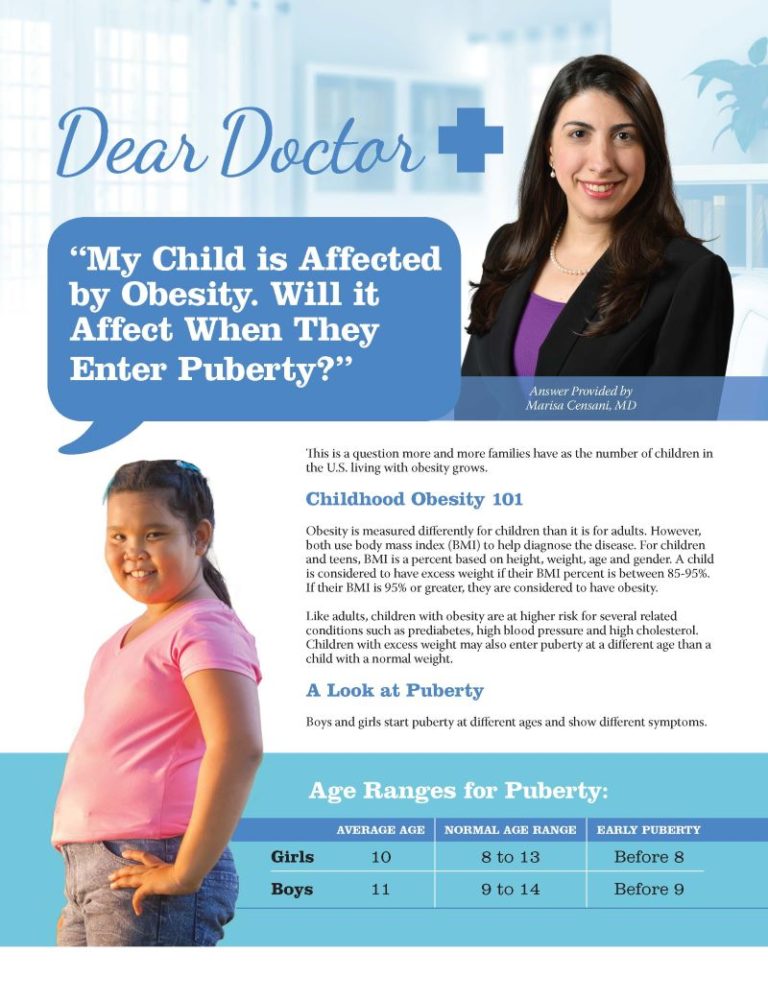Dear Doctor: My Child is Affected by Obesity. Will it Affect When They Enter Puberty?


Answer Provided by Marisa Censani, MD
Fall 2019
This is a question more and more families have as the number of children in the U.S. living with obesity grows.
Childhood Obesity 101
Obesity is measured differently for children than it is for adults. However, both use body mass index (BMI) to help diagnose the disease. For children and teens, BMI is a percent based on height, weight, age and gender. A child is considered to have excess weight if their BMI percent is between 85-95%. If their BMI is 95% or greater, they are considered to have obesity.
Like adults, children with obesity are at higher risk for several related conditions such as prediabetes, high blood pressure and high cholesterol. Children with excess weight may also enter puberty at a different age than children at lower weights.
A Look at Puberty
Boys and girls start puberty at different ages and show different symptoms.
| Average Age | Normal Age Range | Early Puberty | |
|---|---|---|---|
| Girls | 10 | 8 to 13 | Before 8 |
| Boys | 11 | 9 to 14 | Before 9 |
The start of puberty is guided by two glands in the brain. They are the hypothalamus and the pituitary glands. At the start of puberty, the hypothalamus sends a signal to the pituitary gland to release hormones.
Weight and Changes in Puberty
Studies have shown that excess weight and obesity affect the start of puberty differently for boys and girls. In girls, it can cause early puberty and in boys it can delay puberty. While the average age of a girl’s first menstrual cycle has remained 12.5-13 years over the past few decades, studies have shown that the average age of the start of puberty in girls is decreasing.
What Causes Early Puberty?
While it is known that excess weight in girls is associated with early puberty, the exact cause is not known. Many healthcare providers (HCPs) believe it could be caused by an increased number of hormones produced by excess fat cells. Fat cells produce Leptin, which plays a role in appetite regulation, body weight and puberty in girls.
Studies are ongoing to see if there is an environmental link between the use of chemicals, such as pesticides (which can disrupt endocrine production), and changes in puberty.
Are There Side Effects to Early Puberty?
There is no straight-forward answer to this question. This area is being researched as there are concerns about the impact of early puberty on the emotional and social development of pre-teens and teenagers. Another possible side effect is a change in the growth pattern and final height among children who enter puberty early. To monitor for these effects in your pre-teens and teenagers, it is best to keep annual well visits with your child’s HCP.
Can Early Puberty be Misdiagnosed?
Yes. Early puberty can be misdiagnosed in girls with obesity if excess weight is mistaken for breast development. Your child’s HCP will need to conduct a physical exam and review her growth on growth charts.
Growth before puberty averages two inches per year. Growth of more than two inches per year, along with changing growth curves on the growth chart, can be a sign of entering puberty. Your child’s HCP may need to gather more information through hormone measurements, bone maturity assessments or a pelvic ultrasound to make a full diagnosis and determine if any treatment is needed.
Can Early Puberty be Prevented?
There is no clear answer to this question either. Environmental factors can play a role in early puberty. However, childhood obesity is a risk factor for early puberty. So, it is important to talk with your child’s HCP to identify and treat childhood obesity as early as possible. Early treatment is the best way to prevent or reduce the effects of all obesity-related conditions.
In addition to eating a healthy and balanced meal plan, the US Department of Health and Human Services has issued physical activity guidelines for children and teens.
Activity Guidelines for Children and Teens
From Health.gov
- It is important to give children and teens the chance to participate in physical activities that are appropriate for their age, are enjoyable and offer variety.
- Children and teens ages six to 17 years should do 60 minutes (one hour) or more of moderate-to-vigorous physical activity daily:
| Type of Activity | Amount of Time | Suggested Activities |
|---|---|---|
| Aerobic | Most of the 60 minutes per day, at least 3 days per week | Biking, swimming, hiking, soccer, tennis, dancing, running or martial arts |
| Muscle-strengthening | Part of the 60 minutes per day, at least 3 days per week | Swinging, rope or tree-climbing, sit-ups or push-ups |
| Bone-strengthening | Part of the 60 minutes per day, at least 3 days per week | Basketball, gymnastics, hopping, skipping, jumping rope, tennis or running |
Key Points to Remember
Childhood obesity can play a role in early puberty in girls and delayed puberty in boys. It is best to monitor your child’s development and overall health with their HCP through annual visits. Along with a healthy meal plan and physical activity, early treatment for excess weight and obesity can help to lessen or prevent obesity-related conditions including changes in puberty.
About the Author:
Marisa Censani, MD, is a pediatric endocrinologist and the director of the Pediatric Obesity Program in the Division of Pediatric Endocrinology at Weill Cornell Medicine/New York Presbyterian Hospital in New York City. She founded the Kids and Teens Healthy Weight Program at her institution where she has developed afterschool nutritional sessions for families and collaborated with various subspecialists in the prevention and treatment of childhood obesity. She currently serves on the Board of Trustees of the Obesity Medicine Association (OMA) and is coauthor of OMA’s Pediatric Obesity Algorithm. Her obesity research has been reported in numerous media outlets, including Medscape, Medpage Today, Endocrine News, Clinical Endocrinology News, Science news and Science Daily. She is board certified in pediatrics and pediatric endocrinology and is a diplomate of the American Board of Obesity Medicine (ABOM).
by Yelena Kibasova Spring 2024 The fitness world is evolving, with new trends and innovations that promise…
Read Articleby Kendall Griffey, OAC Communications Manager Spring 2024 We have officially kicked off Your Weight Matters Regional…
Read Articleby Zack Lucks, NASM-CPT, EMT Winter 2024 Working out with a loved one is a great way…
Read Article








